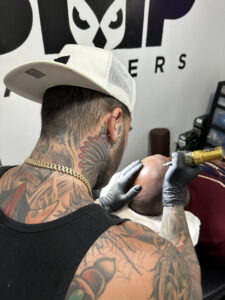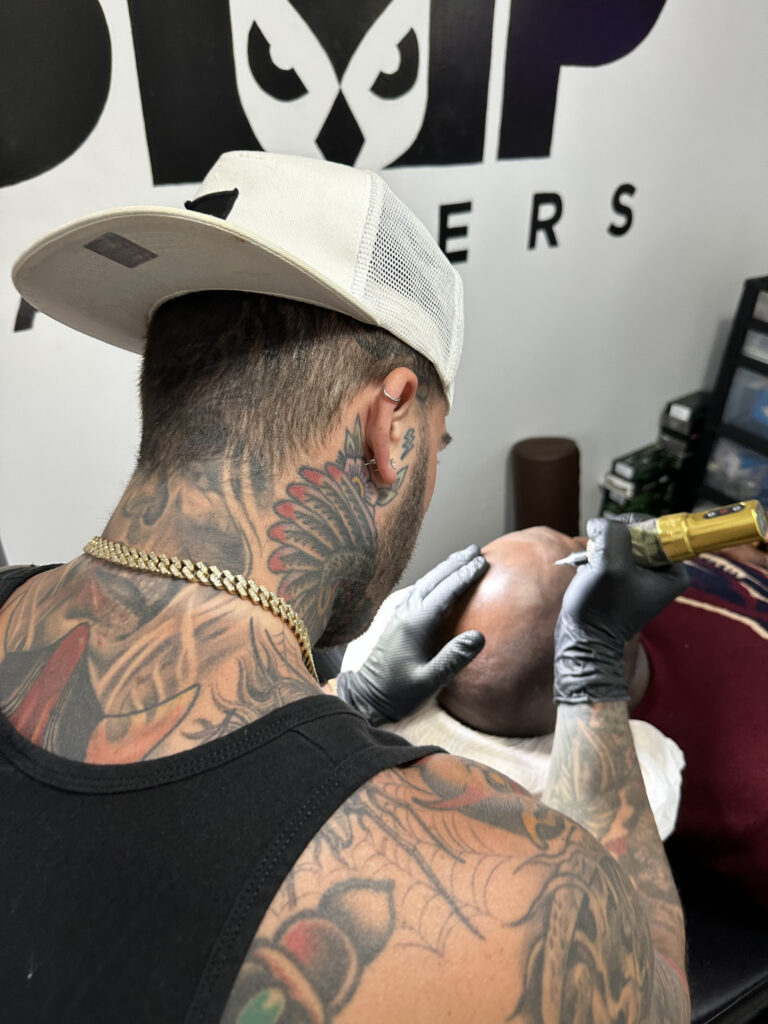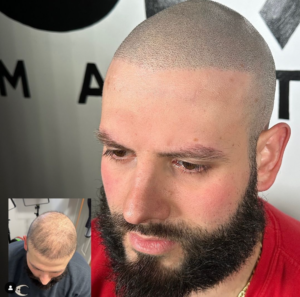At SMP Masters | Scalp Micropigmentation | SMP Artist | SMP Clinic, we often encounter the pivotal question from our clients: “Does Hair Transplant Hurt?” This is a crucial consideration, whether you’re looking at hair transplant options or seeking the best hair tattoo clinic. Our comprehensive guide is designed to demystify the process, focusing on the experience one can expect in Rahway NJ SMP, Elizabeth NJ SMP, and across renowned centers like scalp micropigmentation NYC. As leading SMP artists in New Jersey, including areas like Newark NJ SMP, Marlboro NJ SMP, and extending our expertise to the smp clinic in New Jersey, we offer insights into the nuanced practices of an SMP artist in Manhattan and the broader SMP USA community. From the shores of SMP Long Beach in Long Island to the bustling cityscape of hair tattoo specialists NYC, and the meticulous craft of micro scalp pigmentation USA City, our narrative encapsulates the essence of SMP Huntington in Long Island, and the precision of scalp micro in NY. We’re here to guide you through the spectrum of micro scalp pigmentation NYC, ensuring that SMP Freeport in Long Island, and the specialized practices of scalp micro pigmentation in NY meet your expectations. As SMP masters in Manhattan, we pride ourselves on catering to the needs of Union City NJ SMP, Edison NJ SMP, and Short Hills NJ SMP clients, establishing ourselves as a cornerstone for scalp micro in New Jersey.
Is A Hair Transplant Painful?
Hair transplants have come a long way in terms of technology and techniques, greatly reducing the discomfort associated with earlier methods. These procedures are usually performed under local anesthesia, which means the scalp is numbed, allowing for a pain-free experience during the surgery itself.

Post-Procedure Discomfort
Once the effect of the anesthesia diminishes, it is common to feel some level of tenderness or soreness in the treated area. This post-procedure discomfort is usually manageable with the pain relief medication prescribed by the surgeon.
Recovery and Healing
During the recovery phase, patients may experience some swelling, itching, or a sensation of tightness on the scalp. These side effects are generally mild and temporary. Following the aftercare instructions provided by the clinic is crucial for a comfortable healing process.
Advanced Techniques for Minimized Pain
Modern hair transplant methods like FUE (Follicular Unit Extraction) and FUT (Follicular Unit Transplantation) are designed to minimize trauma to the scalp, thereby reducing pain during and after the procedure.
Professional Care and Guidance
Consulting with a qualified hair transplant specialist is important to understand the specifics of the procedure and to set realistic expectations regarding any discomfort. A good clinic will ensure that patients are well-informed about all aspects of the hair transplant process, including pain management.
Local Anesthesia Injections
Before the hair transplant procedure begins, local anesthesia is administered through injections to numb the scalp. The injections can cause a brief period of discomfort, similar to a pinch or sting, but this is typically short-lived. Once the area is numb, the patient should feel no pain during the hair transplantation process.
Pain Relieving Medications
After the procedure, as the local anesthesia wears off, the patient may begin to feel some discomfort or pain. To manage this, pain-relieving medications are prescribed. These medications are tailored to the patient’s needs to ensure comfort during the initial recovery period.
Light Sedation for Comfort
For patients who are particularly anxious about the procedure or discomfort, light sedation may be offered. This ensures that patients feel comfortable and relaxed throughout the hair transplant. Sedation is administered under strict medical supervision to ensure the patient’s safety and well-being.
Pain & Comfort During Hair Transplantation
Managing pain and ensuring patient comfort are priorities during hair transplantation. The surgical team is experienced in creating a comfortable environment and will monitor the patient throughout the procedure to address any pain immediately. Most patients find that hair transplants are less painful than anticipated and are pleased with the manageable nature of the procedure and recovery.
Hair Transplant Techniques
Hair transplant surgery has evolved with two primary techniques that are commonly used: Follicular Unit Extraction (FUE) and Follicular Unit Transplantation (FUT). Both methods involve transplanting hair from denser areas of the scalp, or other parts of the body, to areas where hair is thinning or balding.
Is a FUE Hair Transplant Painful?
FUE involves individually extracting hair follicles from the donor area and implanting them into the recipient area. Local anesthesia is used during this procedure to minimize pain. Patients typically feel no pain during the FUE procedure itself due to the anesthesia. Post-procedure discomfort is usually mild and can be managed with prescribed pain medications. FUE is often praised for its minimal invasiveness and quicker recovery time.
Is a FUT Hair Transplant Painful?
FUT, or strip method, involves removing a strip of skin with hair follicles from the donor area which is then divided into individual grafts. Like FUE, FUT is performed under local anesthesia to ensure the patient doesn’t experience pain during the surgery. Patients might feel more discomfort during the recovery due to the sutures required for the donor area, but pain can be controlled with medications. The FUT method may involve a longer healing period compared to FUE due to the nature of the incision.
In both FUE and FUT hair transplants, the goal is to minimize patient discomfort as much as possible. Any post-surgical pain can typically be managed effectively with medications, and both techniques have high success rates in terms of growth and patient satisfaction when performed by qualified professionals.
Will pain affect my transplant?
Pain itself is not likely to affect the success of a hair transplant. However, the way a patient responds to discomfort might influence their behavior, which in turn can impact the healing process and ultimately the outcome of the transplant.
Compliance with Post-Operative Care
Patients must follow the surgeon’s post-operative care instructions carefully. If pain is not well-managed and becomes a significant source of discomfort, it may lead to poor compliance with these instructions. For instance, patients experiencing pain might be tempted to scratch the affected area or neglect proper cleaning and care, which can increase the risk of infection or disturb the newly implanted follicles.
Impact on Recovery
Excessive pain, if not managed properly, can lead to increased stress and potentially affect the body’s healing process. Stress has been shown to impair immune function and could possibly slow down the recovery process. Good pain management is essential to ensure that the body can heal optimally.
Avoiding Physical Strain
Patients are advised to avoid strenuous activities immediately after a hair transplant to prevent swelling and increased pain, which can also reduce the chances of dislodging grafts. Experiencing significant pain might indicate that a patient is not resting enough or is engaging in activities that might compromise the transplant’s success.
Psychological Factors
Persistent pain might affect a patient’s mood and mental state, which can influence their overall recovery experience. A positive outlook can be beneficial for recovery, while pain that is not well-managed might lead to anxiety or depression, potentially impacting the healing process.

Hair transplant healing time
Healing Time Overview
The healing time after a hair transplant can vary based on several factors, including the extent of the procedure, the individual’s healing ability, the type of hair transplant performed, and adherence to post-operative care instructions.
Initial Healing Phase
In the first few days following a hair transplant, patients can expect the scalp to be tender. Most clinics will provide a postoperative regimen that includes pain medication and antibiotics to prevent infection. It is critical during this time to avoid touching or scratching the newly transplanted area.
Short-Term Recovery
Within 7 to 14 days after the surgery, patients typically notice the incisions have started to heal, and any non-absorbable sutures are usually removed at this time. The transplanted hair will often fall out during this phase, which is a normal part of the process and not a cause for concern.
Full Recovery and Hair Growth
The full recovery process takes more time. While the surgical wound healing is usually complete within a few weeks, the transplanted hair follicles need time to take root and start growing new hair. This process can take several months. Patients may begin to see new hair growth within 3 to 4 months post-surgery, but it can take up to a year to see the final results.
Long-Term Care
After the initial recovery period, the transplanted hair will shed, known as “shock loss,” and then begin to grow. It’s essential to protect the scalp from the sun and avoid harsh chemical treatments or hairstyles that can stress the hair follicles.
Factors Affecting Healing Time
Healing can also be affected by factors such as smoking, which can impair blood flow to the scalp and delay healing, and the patient’s overall health and age. Following the hair transplant surgeon’s guidelines closely is crucial for the best outcome and quickest recovery.
Is the recovery process painful?
The recovery process after a hair transplant is generally not considered to be intensely painful, but it can involve some discomfort and inconvenience. Here’s what typically happens during the recovery phase:
Immediate Postoperative Period
After the procedure, once the local anesthesia wears off, patients may experience mild to moderate pain and soreness in the treated areas. This can last for a few days and is usually most noticeable once the numbing medication subsides.
Managing Discomfort
The surgical team will provide pain relief medications to manage any discomfort during the initial days following the transplant. This is often sufficient to keep any pain to a manageable level.
Sensations During Healing
Patients may also experience sensations such as tightness, numbness, or itching as the scalp begins to heal. These are normal parts of the healing process and usually subside on their own or can be managed with medications or creams advised by the surgeon.
Swelling and Bruising
Some swelling and bruising around the forehead and eyes can occur, which can be uncomfortable but not necessarily painful. This typically peaks around the third day and then gradually diminishes.
Long-Term Recovery
After the first week, the level of discomfort generally decreases significantly. Patients should be careful to follow their surgeon’s instructions for care during this period to avoid any complications that could cause additional discomfort.
Sleeping Position
Patients may need to sleep in an elevated position to reduce swelling, which can be slightly uncomfortable but is crucial for a speedy recovery.
Returning to Normal Activities
Most patients can return to work and normal activities within a week or two, although they should avoid strenuous exercise for a bit longer to prevent swelling and bleeding.
Advanced Pain Management Techniques
-
At SMP Masters | Scalp Micropigmentation | SMP Artist | SMP Clinic, we utilize the latest advancements in pain management to ensure that our patients experience minimal discomfort. Our Elizabeth NJ SMP and Rahway NJ SMP locations are equipped with state-of-the-art technology to provide pain-free hair transplant solutions. Experience the comfort of modern hair restoration without the fear of pain.
Comprehensive Care and Support
-
From the initial consultation through the recovery process, our team at SMP Clinic in New Jersey and SMP Artist in Manhattan is dedicated to providing comprehensive care. We ensure that all patients, including those from Edison NJ SMP and Union City NJ SMP, are well-informed and comfortable throughout their hair transplant journey. Our personalized approach helps alleviate any concerns about discomfort, making the process as smooth as possible.
Proven Success and Minimal Downtime
-
Our clients at SMP USA and Scalp Micropigmentation NYC have experienced transformative results with minimal downtime and discomfort. By choosing our clinic, you're not only opting for a procedure with a proven track record of success but also a comfortable and swift recovery. Let our SMP Long Beach in Long Island and SMP Huntington in Long Island specialists guide you towards achieving your hair restoration goals with ease.
Expertise in Gentle Techniques
-
As leading hair tattoo specialists in NYC and micro scalp pigmentation experts in USA City, we prioritize gentle techniques that reduce recovery time and pain. Our SMP Masters in Manhattan and Scalp Micro in NY are renowned for their skilled approach that minimizes discomfort and maximizes results. Trust our expert hands to transform your appearance and boost your confidence with minimal pain.
Conclusion
Concluding our comprehensive guide on “Does Hair Transplant Hurt? A Comprehensive Guide to Pain and Procedures,” it’s clear that with the advanced techniques and expert care provided by SMP Masters | Scalp Micropigmentation | SMP Artist | SMP Clinic, the discomfort associated with hair transplants can be significantly minimized. Our specialized approaches, practiced at key locations like scalp micropigmentation NYC, SMP Artist in Manhattan, and SMP Clinic in New Jersey, ensure a comfortable experience for all our clients from Newark NJ SMP to SMP Marlboro NJ. Whether you’re considering a procedure in Elizabeth NJ SMP or looking for the best hair tattoo clinic in Rahway NJ, our commitment to minimizing pain and maximizing satisfaction helps set the standard in hair restoration services, making the journey to regaining your hair and confidence as painless as possible.




